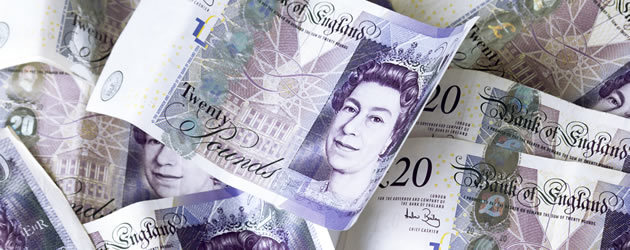The Euro to Pound Sterling exchange rate’s recent drop seems to have been temporary at best, with the pairing rebounding due to positive German data and new British economic concerns gaining significance.
Strong German Ecostats Encourage Euro Rally despite Largely-Expected Eurozone Data
The rally begun by the Euro on Wednesday seems to be continuing as the week draws to an end. A bullish German Consumer Price Index (CPI) print showed that preliminary monthly and yearly figures were both higher than expected.
The initial month-on-month print doubled February’s 0.4% with 0.8%, and the key yearly data showed 0.3% inflation over estimates of 0.1%.
Inspiring investor confidence in the Eurozone once again, the EUR/GBP pair began a steady rally and has risen over 100 pips since Wednesday’s low of 0.7836. The pair currently trades up almost 0.9%, in the region of 0.7988 and close to its highest point since November 2014.
Investors had previously been wary of the Euro, fearing that increased strength may encourage the European Central Bank (ECB) to introduce more easing measures into the Eurozone economy.
However, the positive release of data from the Eurozone’s most powerful member nation sparked hope in investors that Eurozone inflation could increase more healthily than expected and perhaps increase the chances of a future interest rate hike.
Unfortunately these hopes were dashed slightly when German unemployment data and general Eurozone CPI failed to impress.
Eurozone CPI projections were still up from previous sessions, but not considerably above forecasts and therefore not able to promote confidence in investors.
Sterling Suffers as Britain’s Domestic Concerns Continue to Mount
Not able to sustain a positive start to the week, the Pound seems unable to hear the end of it as even in a week without ‘Brexit’ controversy lighting up the headlines, the UK ecopolitical situation causes currency turmoil.
Leading Indian Steel production company Tata Steel seems increasingly intent on selling their UK steel business, which currently supports over 15,000 jobs nationwide but is losing £1m per day on poor trade.
British steel prices are unable to compete with cheaper steel from bigger manufacturing nations like China, and the potential loss of thousands of jobs would be disastrous for Britain’s economy.
The government’s efforts to relieve the situation are also disappointing analysts, who anticipated action would be taken sooner rather than later, as no real action has been taken this week.
Positive UK Gross Domestic Product (GDP) released yesterday, 2.1% over predictions of 1.9%, was also not enough to offset the shock reveal that the domestic current account deficit had risen far more than expected – to a whopping -£32.7 billion and the highest since records began in 1948. Suffice to say, investor faith in George Osborne’s 2016 Budget is likely to have hit an all new low.
UK Manufacturing PMI released this morning also printed lower than expected. While the figure of 51.0 was higher than February’s 50.8, it disappointed forecasts of 51.2 and rounded off a week of bad news for Britain.
Euro to Pound Sterling (EUR/GBP) Exchange Rate Forecast: New Year-Highs on the Horizon?
Edging closer and closer to 2014-level highs, the Euro’s climb against the Pound does seem unlikely to halt as not even positive UK GDP was enough to keep the Pound from weakening further.
Options for the UK’s Tata Steel crisis include selling UK factories, nationalising the industry, or simple closure and loss of thousands of jobs. The ideal solution would be a sale, but understandably buyers are hesitant to purchase an industry currently losing £1m per day. A Tory government would also be unsurprisingly against nationalising the work.
Next week’s more vital Eurozone releases include investor confidence, retail sales, Retail PMI, German industrial production, German Trade Balance and a meeting on ECB monetary policy.
UK data, on the other hand, includes Composite PMI, Industrial Production and Trade Balance.
The Euro to Pound Sterling (EUR/GBP) exchange rate currently trends around 0.7988 while the Pound Sterling to Euro (GBP/EUR) exchange rate trends in the region of 1.2516.



